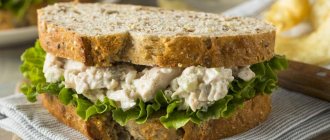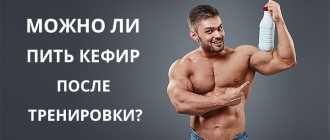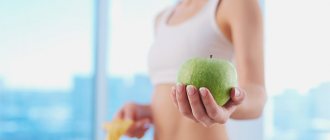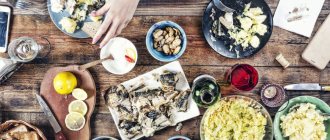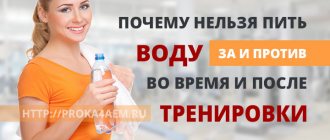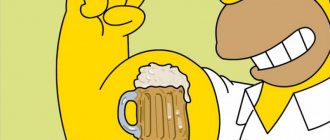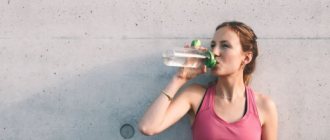How soon can you eat after training? The issue of nutrition is quite acute for those who monitor their health and play sports. It is known that physical activity by itself does not have much effect.
They must be combined with proper nutrition, sleep patterns, and the absence of bad habits.
To create your diet, you need to know your daily calorie intake. Here is a convenient calculator for calculation
In this material we will talk about the main nuances of nutrition for athletes. We will answer the questions: when can you eat after training, what foods should be included in your diet, and what is absolutely not recommended to eat. We will find out how nutrition after strength training differs from nutrition after cardio exercise, and also get acquainted with the concepts of carbohydrate and protein window, around which there are many myths.
What foods are eaten after what types of workouts?
All training can be divided into two main types:
- Aerobic;
- Power.
Let's take a closer look at the question of which diet is suitable for each type of training.
Diet after aerobic exercise
The main goal of aerobic exercise in most cases is to lose weight or stay in shape. In this case, the diet should contain foods that contain fiber.
The diet a person consumes after aerobic exercise affects the body's recovery. Try to include the following products:
- Bran;
- Cabbage and green leafy vegetables;
- Berries;
- Fruits;
- Mushrooms;
- Legumes;
- Almonds;
- Cocoa;
- Figs
All these products contain a lot of fiber, which will help the body recover.
Diet after strength training
Strength training helps pump up the body's muscular system. To increase muscle mass, it is recommended to fill your diet with foods high in protein.
The diet should contain:
- Chicken and other types of lean meat;
- Low-fat cottage cheese;
- Kefir;
- Egg whites;
- Tofu, soy, beans;
- Red meat;
- Fish;
Any exercises that a person performs during training provoke muscle growth. Muscle mass will grow gradually and one of the main catalysts for growth will be recovery. During training, micro-tears occur in the muscle fibers, which subsequently heal and also increase muscle volume. Eating a diet containing protein will help speed up the healing process and speed up muscle gain.
Sports nutrition after training in the evening
Unfortunately, it is not always possible to prepare a full-fledged healthy fitness dinner in the evening after a workout. But you shouldn’t be upset about this - after all, special nutrition for professional athletes and for those who take care of their body has long been invented:
- Amino acids
. Needed for muscle growth and restoration of their structure. Simply put, amino acids are the building blocks from which muscle cells are built. BCAA is a dietary supplement that contains 3 essential amino acids that are directly involved in the formation of muscle tissue (leucine, isoleucine and valine). - Protein
. A supplement whose main component is protein (whey, milk). Protein shakes can replace a meal before or after a workout: it is very convenient (easy to prepare - just shake a portion of the shake with milk, water or juice) and healthy (the balanced composition provides the body with all the necessary substances). - Gainers
. Supplements that contain mainly carbohydrates (easily digestible slow and fast) and protein (most often whey protein). Gainers are indispensable for those who want to gain muscle mass. The product also contains vitamins, minerals and creatine. - Creatine
is a substance that takes an active part in energy metabolism and the construction of muscle cells. - L
-
carnitine - ensures the delivery of fats from the body's cells to the muscles, where they are processed and converted into energy.
Please help make this article better. Answer just 3 questions.
Sports nutrition is a very simple and convenient way to have a quick and tasty dinner after evening strength and aerobic exercise:
- When losing weight
. Many people believe that you can’t eat sports nutrition when losing weight. In fact, protein shakes, amino acids (in particular BCAAs - essential acids), L-carnitine are useful both for those who build muscle mass and for those who want to lose a couple of extra pounds. It is recommended to drink protein for weight loss 30-40 minutes after training; other supplements are best taken in consultation with the trainer. - When gaining weight
. Everything is obvious here - for best results you need to take protein several times a day. The protein shake can be supplemented with a portion of low-fat cottage cheese. To quickly gain muscle mass, it is also recommended to take creatine. After training (half an hour later), a portion of a high-carbohydrate gainer would be useful. - Drying.
L-carnitine, amino acids and protein shakes are the main food for a cutting athlete. These products contain virtually no fat, which greatly simplifies the fat burning process. Amino acids ensure protein synthesis and provide the body with energy.
The advantage of sports nutrition over regular food is that these products contain an optimal range of nutrients, a minimum of unnecessary components, are quickly absorbed and provide a long-lasting feeling of fullness.
When can you eat after strength training?
After training, eating should be no earlier than 30-40 minutes later. During this time, the body uses your fat deposits and internal reserves as nutrients, which helps with weight loss and staying in shape. If you start eating immediately after training, the effect will be minimal.
After your first protein meal 40 minutes after training, you need to eat a full meal in the next 2 hours.
What can't and can't be eaten after training?
Let's take a closer look at what foods you can eat after training and what foods are not recommended at all.
What is possible
- Dairy products. Protein synthesis in the muscles will accelerate if you eat foods containing milk after exercise. Yogurt, kefir, low-fat cottage cheese are suitable;
- Eggs. Boiled or fried eggs, as well as an omelet, are good post-workout snack options. The yolk contains substances that catalyze muscle growth;
- Complex carbohydrates. During intense physical activity, it is recommended to consume complex carbohydrates, this will help the body tolerate stress more easily;
- Healthy fats. You shouldn’t lean heavily on fatty foods, but foods with a low percentage of healthy fats can be included in your diet;
- Protein shake – if you want to gain muscle mass.
What not to do
- It is better to replace food fried in oil with other dishes prepared in a more gentle manner, baked or boiled;
- It is not recommended to abuse simple carbohydrates at night. Watch the amount of sweet foods and fruits you eat in the afternoon;
- Complex carbohydrates are recommended to be consumed before lunch, in the first half of the day. This will help recharge your energy for the whole day, since their breakdown inside the body occurs gradually;
- Foods high in sugar can ruin your efforts during exercise. Try not to eat sweets, chocolate, cookies, marmalade and sweet carbonated water after training;
- Fast food is also not an option. Increases cholesterol in the blood, increases the risk of developing liver and vascular diseases;
- It is better not to consume raw vegetables and fruits after training. The body will spend a lot of energy processing them, much more than it receives from their consumption.
Examples of foods you can eat after training:
- Fish dishes with vegetable salads;
- Boiled chicken breast with a side dish of buckwheat or rice;
- Scrambled eggs with peppers and tomatoes;
- Oatmeal and other porridges with toppings in the form of nuts;
- Pancakes stuffed with berries, fruits or cottage cheese;
Misconceptions and myths about nutrition for muscle growth
1. When you are in a calorie deficit, you can gain lean muscle mass. Unfortunately, these are just dreams, because muscles will not grow without replenishing the proper energy costs.
2. The feeling of permissiveness in gastronomic excesses is one of the most dangerous misconceptions among mass gainers. The optimal excess of calories for weight gain is no more than 500. And here, along with pies, cakes, beer, and smoked lard, the body receives thousands of calories.
3. Most athletes who adhere to the accepted nutrition system believe that it is difficult for vegetarians and raw foodists to gain weight, although in fact this is a very common misconception. All essential amino acids and proteins are found in plant foods. You can also use soy protein. Vegetarian bodybuilders have long developed the principle of complementarity of products in the diet - consuming several types of plant products that contain different amino acids at one time. Plant foods are also rich in carbohydrates, and also help build lean muscle mass, preventing atherosclerosis and obesity. The only disadvantage of this diet is the deficiency of cyanocobalamin (B12), which is not found in plant foods, and its deficiency leads to anemia.
4. The fact that no more than 30 grams of protein is absorbed in one meal is nothing more than a myth. In fact, no one knows how much protein is absorbed in one meal. It all depends on the individual characteristics of each organism.
5. The opinion that it is impossible to achieve results without sports nutrition and supplements is also considered erroneous. Everything is possible if the diet contains all the necessary elements for gaining muscle mass and if the trainee is not preparing for competitions.
Proper nutrition during sports
As mentioned above, physical activity without proper nutrition greatly loses its effectiveness. Below are the basic rules that will help you determine your diet and recover after exercise.
Follow your diet
Eating should be no later than 2 hours before training and no earlier than 30 minutes after training. You should not fast before or after training. The body needs a supply of nutrients and microelements. A small post-workout snack is a good way to give your body a quick source of energy. Then, after a couple of hours, you need to take a full meal.
Don't forget to drink water
During intense exercise, the body loses a lot of fluid. You need to replenish the water and mineral balance in the body and prevent dehydration. During training, you can drink a small amount of liquid, and after training, you can completely replenish the losses.
A good option would be mineralized water - it will simultaneously quench your thirst and replenish your mineral balance.
Snacks
A quick meal 30-40 minutes after exercise is called a snack. The best foods for them are those that quickly restore energy: bananas, cereal bars, fruit purees, juices.
Protein intake
Muscles need protein to recover. Add protein foods to your diet, regardless of the type of exercise you receive. In the morning, a good option would be omelet or eggs, which contain protein that helps muscles recover faster. For dinner, you can eat fish rich in protein and omega-3, such as salmon.
Drinks, supplements and protein shakes
A person cannot always get the required amount of vitamins, dietary supplements and microelements from regular food. In this case, various dietary supplements and protein shakes come to the rescue.
For those who are intensely involved in strength sports and want to pump up their body faster, you can try adding a protein shake to your diet. You can buy the powder version, or you can make it from natural products at home. You will need milk, banana, yogurt and oatmeal.
How to build a power system
The more often you exercise, the more strength and energy your body spends on recovery. Therefore, the diet of people with normal and increased physical activity should differ. The second has a balanced diet, with an increased rate of proteins, carbohydrates and fats, excluding processed foods, fast food and other foods harmful to health.
Natural food is what will lead you to your sports goal. Proper nutrition combined with regular exercise will help not only get rid of extra pounds, but also gain muscle mass. Monitor your calories using the chart below.
Food calorie table
| Product | Kcal/100g | Product | Kcal/100g | Product | Kcal/100g | Product | Kcal/100g |
| Meat (poultry meat products) | Fish and seafood | Dairy | Cereals and legumes | ||||
| Fatty lamb | 316 | Granular caviar | 250 | Acidophilus (3.2%) | 58 | Green peas | 280 |
| Ham | 365 | Chum salmon caviar | 245 | Cow cheese | 260 | Wheat flour | 348 |
| Beef stew | 180 | Pollock caviar | 130 | Yogurt (1.5%) | 51 | Rye flour | 347 |
| Fried beef | 170 | Squid | 75 | Full fat kefir | 60 | Cocoa powder | 375 |
| Brisket | 475 | Carp | 46 | Kefir 1% | 38 | Buckwheat | 346 |
| Goose | 300 | Fried carp | 145 | Kefir 0% | 30 | Semolina | 340 |
| Turkey | 150 | Chum salmon | 157 | Milk (3.2%) | 60 | Oatmeal | 374 |
| Boiled sausage | 250 | Canned fish in oil | 320 | Whole cow's milk | 68 | Pearl barley | 342 |
| Semi-smoked sausage | 380 | Canned fish | 120 | Ice cream | 220 | Wheat groats | 352 |
| Korean | 430 | Shrimps | 85 | Curdled milk | 59 | Barley groats | 343 |
| Rabbit meat | 115 | Crabs | 70 | Ryazhenka | 85 | Cornflakes | 369 |
| Boiled chicken | 135 | Bream | 48 | Cream 10% | 120 | Pasta | 350 |
| Fried chicken | 210 | Fried salmon | 145 | Cream 20% | 300 | Cereals | 305 |
| Beef liver | 100 | Smoked salmon | 385 | Sour cream 10% | 115 | Rice | 337 |
| Kidneys | 66 | Pollock | 70 | Sour cream 20% | 210 | Soybeans | 395 |
| Sausages | 160 | Sea kale | 16 | Dutch cheese | 357 | Beans | 328 |
| Pork chop | 265 | Navaga | 44 | Lambert cheese | 377 | Lentils | 310 |
| Pork stew | 350 | Perch | 95 | Parmesan cheese | 330 | Barley flakes | 315 |
| Heart | 87 | Cancers | 75 | Russian cheese | 371 | Millet | 351 |
| Sausages | 135 | Salaka | 98 | Curd cheeses | 380 | Oatmeal | 357 |
| Veal | 90 | Stellate sturgeon | 137 | Cottage cheese 18% | 226 | Nestle Corn Flakes | 368 |
| Duck | 405 | Atlantic herring | 57 | Curd with sour cream | 260 | ||
| Language | 165 | Zander | 43 | Low-fat cottage cheese | Chicken egg | ||
| Cod | 59 | Chicken egg 1 piece | 65 | ||||
| Sprats in oil | 250 | Egg powder | 540 | ||||
| Pike | 41 | ||||||
| Flounder | 88 | ||||||
Nutrition rules for athletes
Before training
Eating before classes is a way to obtain resources for your physical development during and after training. Protein products replenish the balance of amino acids in the body and are responsible for increasing muscle volume, while carbohydrate products provide additional energy for long hours of training, increase activity and stimulate insulin production.
In order for you to feel at ease and be able to exercise freely, your body must have time to absorb food. I recommend eating complex carbohydrates 2-3 hours before training: cereals from various cereals, cereals, legumes and fruits with a glycemic index of up to 60.
Menu for men
- 2 pinches of nuts
- Medium portion of porridge
- 200–250 g chicken fillet
- 2 cups vegetables
- Glass of water
Menu for women
- A pinch of nuts
- Small portion of porridge
- 100 g chicken fillet
- Cup of vegetables
- Glass of water
This dosage has an average value. To quickly achieve the desired sports result, it is better to contact a coach and together with him choose the best option for you.
During training
Water is what your body especially needs during the training process. Taking it in moderation will prevent dehydration and affect the rate of regeneration.
Nutrition during training is a necessity only for those who are engaged in fitness and bodybuilding professionally, are trying to gain weight and are preparing for competitions. As a rule, such athletes use special sports nutrition cocktails for their purposes.
After training
Muscle formation, replenishment of strength and energy, and general recovery are the main goals of nutrition after performing a set of exercises.
Within 1-2 hours after training, be sure to take protein and carbohydrate-containing foods. The former stimulate the growth of muscle tissue, and the latter maintain the required level of glycogen for 24 hours and promote rapid regeneration of tissues and organs. Don't rush to eat right away: drink a glass of warm water and take a short walk before eating. Menu for men
- Medium portion of porridge
- 200 grams of lean meat
- 2 cups vegetables
- A glass of low-fat kefir
Menu for women
- Medium portion of porridge
- 100 grams of lean meat
- Cups of vegetables
- A glass of low-fat kefir
What to eat after training if you are losing weight?
The main principle of losing weight is to consume fewer calories than you burn. In order to maintain this balance, it is worth eliminating high-fat foods from your diet and reducing the number of calories you consume.
Here is a list of the best foods that you can and should eat after training when losing weight:
- Boiled chicken contains amino acids and easily digestible protein. Helps quickly restore muscle tissue, and due to B vitamins, accelerates metabolism;
- Turkey is rich in protein, contains vitamins A, E and microelements. Improves the process of fat breakdown;
- Seafood – the content of amino acids, vitamins and minerals makes seafood almost irreplaceable. Accelerate metabolism, improve fat removal, stabilize the functioning of the cardiovascular system;
- Rice is a source of complex carbohydrates, vitamin B and minerals. Saturates the body, eliminating the feeling of hunger;
- Beans are a low-calorie product with a high protein content, about 22 grams per 100 grams of product;
- Low-fat cottage cheese is a good option for restoring muscle tissue. Contains natural protein;
- Mineral water, freshly squeezed juice, green tea without sugar - all this is suitable as a source of liquid.
- Turkey pilaf
